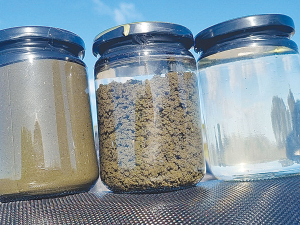Waikato dairy effluent breaches lead to $108,000 in fines
Two farmers and two farming companies were recently convicted and fined a total of $108,000 for environmental offending.
 Effluent is separated into two parts - solid that gets composted and a cleansed water reused for washdown and irrigation.
Effluent is separated into two parts - solid that gets composted and a cleansed water reused for washdown and irrigation.
An innovative dairy effluent management system is being designed to help farmers improve on-farm effluent practices and reduce environmental impact.
Farm trials are underway to ensure the technology works effectively across various farming environments.
Developed by Ballance Agri-Nutrients, Plucks Engineering and Southwater, the technology aims to address a significant environmental and regulatory challenge in New Zealand’s dairy sector. In addition, the by-product of the system is a nutrient and water source that can be recycled on farm.
“Incorrect disposal of effluent can land farmers with fines in the hundreds of thousands, and regulations restrict effluent application during rainy conditions, meaning farmers are often left with an issue to deal with,” says Stuart Kay, innovation lead at Ballance.
“This technology is designed to be a reliable, sustainable solution, transforming waste into a resource that improves compliance and lowers risk. By providing control over water and nutrients, we’re offering a pathway for more responsible and effective farm management.”
The new effluent management system, first conceptualised in 2020, offers dairy farmers an easy way to retrofit a practical solution to meet both current and future effluent storage and regulatory demands. As regulations evolve, farmers often need to renew their consents and invest in upgrading effluent systems to ensure adequate storage, control, and mapping.
Additionally, current regulations cap nitrogen application from effluent at 150 N/ha/year, meaning farmers must carefully manage their land area to avoid over application per hectare. The effluent system has been developed to aid farmers to specifically meet these requirements.
Plucks Engineering has been at the coal face of dairy effluent for nearly 30 years and says it knows and understands the burden dairy farm effluent can impose.
We love what we have developed together with our partners which removes all the stress for the farmer and gives them complete control of their effluent from day one, while removing all the risk and liability,” says Neil Pluck, managing director at Plucks Engineering.
Southwater’s core business is the dredging of municipal and industrial pond slurries into high-capacity dewatering systems to separate the water from solids. The project with Ballance and Plucks is a natural extension of the approach but with critical steps in the process being dairy specific.
Fonterra’s impending exit from the Australian dairy industry is a major event but the story doesn’t change too much for farmers.
Expect greater collaboration between Massey University’s school of Agriculture and Environment and Ireland’s leading agriculture university, the University College of Dublin (UCD), in the future.
A partnership between Torere Macadamias Ltd and the Riddet Institute aims to unlock value from macadamia nuts while growing the next generation of Māori agribusiness researchers.
A new partnership between Dairy Women’s Network (DWN) and NZAgbiz aims to make evidence-based calf rearing practices accessible to all farm teams.
Despite some trying circumstances recently, the cherry season looks set to emerge on top of things.
Changed logos on shirts otherwise it will be business as usual when Fonterra’s consumer and related businesses are expected to change hands next month.
OPINION: Fonterra may be on the verge of selling its consumer business in New Zealand, but the co-operative is not…
OPINION: What does the birth rate in China have to do with stock trading? Just ask a2 Milk Company.